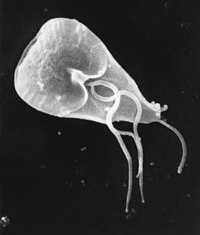
Photo from wikipedia
Purpose of review Giardiasis remains a common cause of diarrhea and intestinal enteropathy globally. Here we give an overview of clinical treatment studies and discuss potential mechanisms and molecular targets… Click to show full abstract
Purpose of review Giardiasis remains a common cause of diarrhea and intestinal enteropathy globally. Here we give an overview of clinical treatment studies and discuss potential mechanisms and molecular targets for in-vitro testing of drug resistance. Recent findings Giardia is a cause of disease both in diarrheal and nondiarrheal cases. The prevalence of treatment refractory giardiasis is increasing. Recent studies reveal 5-nitroimidazole refractory infection occurs in up to 50% of cases. Mechanisms of drug resistance are not known. Placebo controlled studies of drug efficacy, taking the self-limiting course of giardiasis into account, has not been reported. No randomized controlled trials of treatment of refractory infection have been performed the last 25 years. Based on the clinical studies reported, combination treatment with a 5-nitroimidazole and a benzimidazole is more effective than repeated courses of 5-nitroimidazole or monotherapies in refractory cases. Quinacrine is effective in refractory cases, but potentially severe side effects limit its use. Summary A combination of a 5-nitroimidazole and albendazole or mebendazole, and quinacrine monotherapy, are rational choices in nitroimidazole refractory infections, but randomized controlled studies are needed. Further research into more recent clinical isolates is necessary to uncover mechanisms for the increase in metronidazole refractory giardiasis observed during the last decade.
Journal Title: Current Opinion in Infectious Diseases
Year Published: 2020
Link to full text (if available)
Share on Social Media: Sign Up to like & get
recommendations!